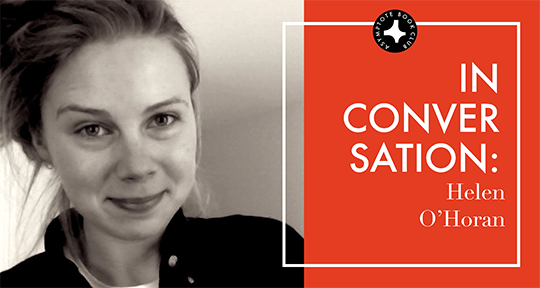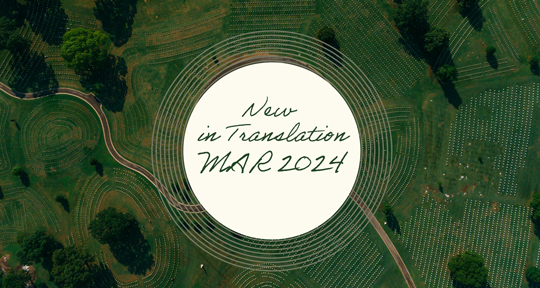Sachiko Kashiwaba’s The Village Beyond the Mist is a moving and fantastical story of a young girl’s burgeoning independence, taking place in a strange village nicknamed Absurd Avenue. Kashiwaba is a prolific author of children’s literature in Japanese, with her oeuvre ranging from the grounded and slightly magical to the utmost heights of imagination—but embedded alike with a deep emotional resonance. Widely read by both children and adults, The Village Beyond the Mist in particular has had a global effect as the inspiration behind Hayao Miyazaki’s Spirited Away, and Avery Fischer Udagawa’s English translation now renews this magical book for US readers.
Udagawa’s repertoire of translations contains a number of Kashiwaba’s works, including Temple Alley Summer (2021) and The House of the Lost on the Cape (2023), both from Restless Books. In the following conversation, we discussed Kashiwaba’s influential body of children’s literature and Udagawa’s thought process while working on The Village Beyond the Mist.
Bella Creel (BC): You’ve translated a number of works by Sachiko Kashiwaba, from short stories to three full-length novels. From what I’ve read in your translations, it seems that her works, while often fantastical, remain grounded in real-life challenges—coming of age, the loss of a loved one, or the relationship between parent and child. How would you describe Kashiwaba as an author—what seems to drive her writing?
Avery Fischer Udagawa (AU): Sachiko Kashiwaba’s work seems to well up from both a deep love of Japanese storytelling and a vast knowledge of European and North American children’s literature, gained through a voracious reading of translations that began in childhood. Her works refer in form or content to a wide range of sources, from the Brothers Grimm fairy tales to L. M. Montgomery to the Tōno monogatari, the collected folklore of the Tōno region in her native prefecture of Iwate. The afterword to her debut novel mentions The Chronicles of Narnia and Mary Poppins—before going on to thank the father of Japanese fantasy, Satoru Satō.
She has said that she hopes above all for readers to enjoy reading her books, finishing them and saying, “ah, that was fun.” But I have only to flip through her long-running Monster Hotel series—featuring a vampire and witches alongside a partially shifted kitsune (fox) girl and a rokurokubi (long-necked spirit)—to see how she relishes braiding the traditions she grew up with.
Her concern for real children and families is also palpable, perhaps especially in work that she produced shortly after the Tōhoku earthquake and tsunami of March 2011, which affected Iwate. Her novel The House of the Lost on the Cape was first serialized in the city newspaper of Morioka, where she lives, for young readers who would have experienced grief, trauma, and survivor’s guilt just like the characters in House. In the story, she marshals kappa river spirits, stone lion-dogs from a Kesennuma shrine, and a giant Jizō statue from near her own house to facilitate communal healing.
Virtually all of Kashiwaba’s stories feature insights about families, such as how a growing daughter and her father may suddenly find themselves talking less; in The Village Beyond the Mist, a shared knowledge of a place promises to be the key to reopening communication.
BC: Alongside your role as a teacher, you have also built a prolific career in the translation of children’s literature—how did you find this niche? READ MORE…














Blog Editors’ Highlights: Winter 2025
Reviewing the manifold interpretations and curiosities in our Winter 2025 issue.
In a new issue spanning thirty-two countries and twenty languages, the array of literary offers include textual experiments, ever-novel takes on the craft of translation, and profound works that relate to the present moment in both necessary and unexpected ways. Here, our blog editors point to the works that most moved them.
Introducing his translation of Franz Kafka’s The Trial in 2012, Breon Mitchell remarked that with every generation, there seems to be a need for a new translation of so-called classic works of literature. His iteration was radically adherent to the original manuscript of The Trial, which was diligently kept under lock and key until the mid-fifties; by then, it was discovered exactly to what extent Max Brod had rewritten and restructured the original looseleaf pages of Kafka’s original draft. It is clear from Mitchell’s note that he considers this edit, if not an offense to Kafka, an offense to the reader who has lost the opportunity to enact their own radical interpretation of the work: an interpretation that touched Mitchell so deeply, he then endeavored to recreate it for others.
In Asymptote’s Winter 2025 Issue, the (digital) pages are an array of surprising turns of phrase and intriguing structures—of literature that challenges what we believe to be literature, translations that challenge what we believe to be originality, and essays that challenge what we believe to be logic. I am always drawn to the latter: to criticism, and writing about writers. As such, this issue has been a treat.
With the hundredth anniversary of Kafka’s death just in the rearview and the hundredth anniversary of the publication of The Trial looming ever closer, the writer-turned-adjective has not escaped the interest of Asymptote contributors. Italian writer Giorgio Fontana, in Howard Curtis’s tight translation, holds a love for Kafka much like Breon Mitchell. In an excerpt from his book Kafka: A World of Truth, Fontana discusses how we, as readers, repossess the works of Kafka, molding them into something more simplistic or abstract than they are. In a convincing argument, he writes: “The defining characteristic of genius is . . . the possession of a secret that the poet has no ability to express.” READ MORE…
Contributors:- Bella Creel
, - Meghan Racklin
, - Xiao Yue Shan
; Languages: - French
, - German
, - Italian
, - Macedonian
, - Spanish
; Places: - Chile
, - France
, - Italy
, - Macedonia
, - Switzerland
, - Taiwan
, - Turkey
; Writers: - Agustín Fernández Mallo
, - Damion Searls
, - Elsa Gribinski
, - Giorgio Fontana
, - Lidija Dimkovska
, - Sedef Ecer
; Tags: - dystopian thinking
, - identity
, - interpretation
, - nationality
, - painting
, - political commentary
, - revolution
, - the Cypriot Question
, - the Macedonian Question
, - translation
, - visual art
, - Winter 2025 issue
, - world literature